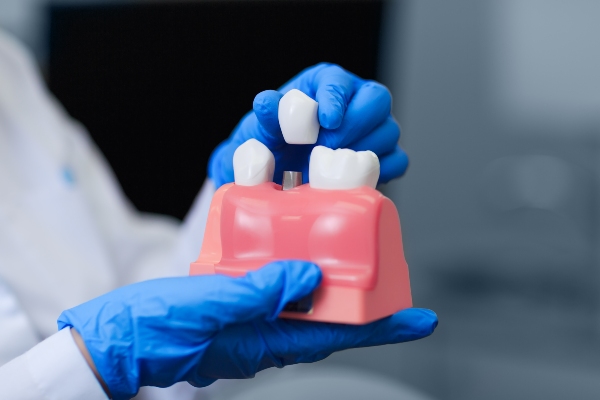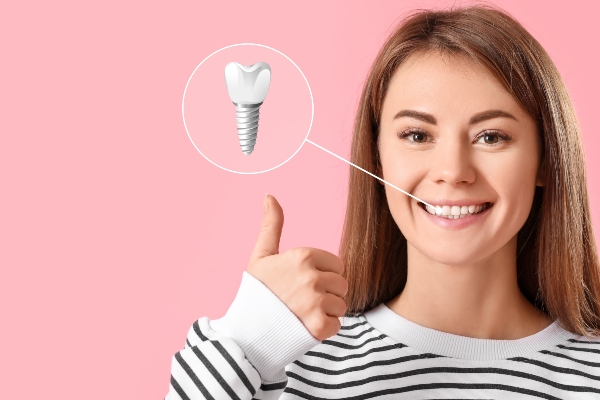Ask a General Dentist: What are the Benefits of Flossing?

A general dentist will tell you all of the benefits of flossing on a regular basis. Flossing should be a very important part of your daily oral hygiene routine. Brushing your teeth is the first round of defense in fighting tooth decay but do not underestimate the value of flossing.
When you get into the habit of flossing regularly, you make sure the particles between your teeth are removed right away. Plaque can build up very quickly, and flossing is one way to ensure you are not letting particles linger in hard-to-reach places.
The benefits of flossing go beyond the particles left behind in your mouth. If we can take a few minutes to floss a day, we are saving ourselves from gum disease, tooth loss, bad breath, and cavities.
All patients want to have their original teeth for as long as possible. Paying attention to how you take care of your teeth should be an important concern in your daily routine.
Should I floss after I eat?
Flossing after you eat can help prevent tartar and plaque build-up. The benefits of flossing are proven to aid in fighting cavities, gum disease, bad breath, and even tooth loss. Your dentist will tell you to try to floss after every meal when possible.
Flossing is a simple and quick task that can save you from long-term damage to your overall oral health. Your mouth will also feel clean and fresh in the middle of the day by simply flossing. We all worry about having not-so-fresh mouths after a work lunch, and flossing can solve the problem within minutes.
Flossing in-between meals will help remove any food particles that may have settled while you were eating. Brushing and flossing are the two most important habits a person can develop when taking care of their oral health.
Benefits of flossing
You should establish a routine when it comes to your daily brushing habits. Brushing your teeth twice a day and flossing between meals is the perfect routine. Your general dentist will tell you the top reasons you should floss:
- Healthy oral care. Flossing alone will give you an advance for your oral health. Your oral health also aids in your overall body health. Preventative oral care has been linked to preventing heart attacks and strokes. A person’s oral care does have a lasting effect on their overall health and should never be taken for granted.
- Flossing will prevent tartar and plaque build-up. Tartar and plaque cause cavities and no one wants to be at the dentist to get a cavity filled. Any build-up you can remove before it even starts is something you should not take lightly.
- Prevents Gum Disease. Gum disease results from what happens when tartar and plaque are allowed to build up on tooth enamel. Your gums can become swollen, and if left untreated, you can end up with tooth loss.
Brushing your teeth twice a day alone is not enough to keep up with your oral health. You need to floss between every meal or as much as possible. Flossing will not allow bacteria to sit and cause long-term health issues.
Flossing removes all of the left behind debris from brushing. If you don’t remove the particles left behind and between your teeth, you are setting yourself up for a decline in your oral hygiene.
Your dental hygienist can give you tips on floss and keeping your mouth healthy. Always remember to attend your dental exams every six months as recommended by your general dentist. Your routine exams are when your dentist can find any health issues soon enough to be treated before they turn into more serious ones.
Ask your dentist
During your routine visits to your dentist, you can feel free to ask them for any pointers on how you can better floss your teeth. If you are missing certain areas, your dental hygienist is the best person to help you to see what you are doing wrong and how you are missing plaque.
Your dentist wants you to have your original teeth for as long as possible. They are your best source for answering any questions about your dental hygiene, oral health, and flossing habits.
Don’t put off asking any questions about cleaning your teeth at your routine dental exams. Your dentist and hygienist are there to help you get the most out of your oral hygiene routine.
Request an appointment here: https://metrosmiles.com or call Metro Smiles Dental at (718) 841-9591 for an appointment in our Forest Hills office.
Check out what others are saying about our dental services on Yelp: General Dentist in Forest Hills, NY.
Recent Posts
A general dentist can relieve a toothache after a proper assessment. This type of dental problem is often accompanied by swelling. It may even occur with a migraine, fever, or earache. Tooth pain needs immediate treatment. Here are the details on what a general dentist can do for a toothache.Each toothache is different. That is…
Your general dentist is here to provide some information about how to best take care of your teeth. Dental health and hygiene are essential to the overall health and wellness of your body. Without healthy teeth and gums, you will be unable to take in the nutrients and proteins necessary for your body to thrive…
A general dentist is the best source to ask when looking for ways to prevent a toothache. Scheduling an appointment for a toothache is one activity we would love to avoid. We all know that we should go to the dentist every six months to prevent cavities, but there are times when toothaches decide to…
Tooth decay is one of the most common oral health concerns that general dentistry offices deal with. The good news is that there are effective and minimally invasive ways to treat most cases of tooth decay, and patients can prevent tooth decay from developing through good oral hygiene practices and regular dental cleanings.Tooth decay is…


